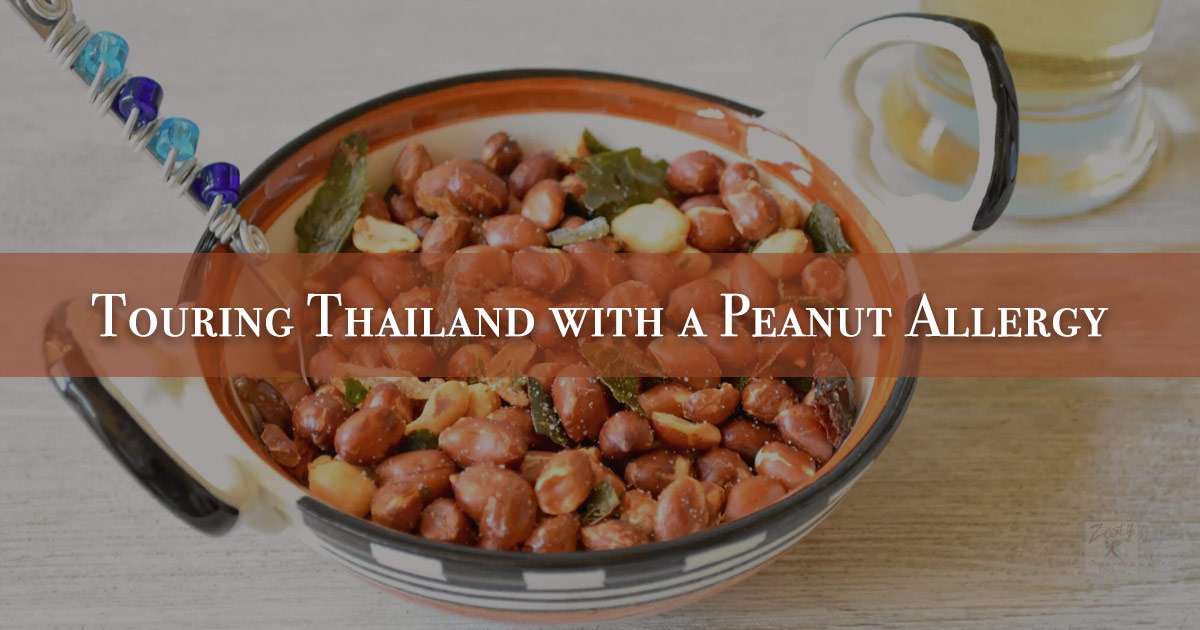Traveling to Thailand with a Peanut Allergy: Important Tips to Consider

Does Thai Food Have Peanuts? Thai food is known for its rich, vibrant flavors and diverse ingredients. However, if you have a peanut allergy, it’s crucial to understand how prevalent peanuts are in Thai cuisine. The question, “Does Thai food have peanuts?” is not just about taste but also about safety. Peanuts are a common ingredient in many Thai dishes, making it essential for those with allergies to be vigilant.
How Often Does Thai Food Use Peanuts?
Peanuts are a staple in Thai cuisine, and they’re used in a variety of dishes. Here’s how frequently you might encounter them:
- In Many Dishes: Peanuts are often used in Thai dishes like Pad Thai, which features stir-fried noodles garnished with crushed peanuts.
- In Sauces and Dressings: Many Thai sauces, including satay sauce and certain curry sauces, contain peanuts or peanut oil.
- As a Garnish: Peanuts are frequently sprinkled on top of dishes like salads and noodles, adding crunch and flavor.
- In Street Food: Street vendors commonly use peanuts in their recipes, making street food a potential risk for those with peanut allergies.
Understanding the prevalence of peanuts in Thai food is crucial for avoiding accidental exposure.
How to Tour Thailand Without Eating Peanuts
Traveling in Thailand with a peanut allergy can be challenging, but with careful planning and the right precautions, you can enjoy your trip safely. Here’s how you can navigate Thai food while avoiding peanuts:
Carry Allergy Pills and an EpiPen
It’s crucial to always carry your allergy medication and an EpiPen. These items are essential for managing an allergic reaction. Make sure you:
- Have a Sufficient Supply: Bring enough medication for the entire trip, plus a little extra in case of emergencies.
- Keep Them Accessible: Store your pills and EpiPen in a place where you can easily reach them. Consider carrying them in a small, easily accessible bag.
- Check Expiry Dates: Before you travel, ensure that your medications are not expired.
By being prepared, you can handle any unexpected reactions promptly and safely.
Show an Allergen Card
An allergen card is a helpful tool for communicating your peanut allergy to others, especially in a country where the language might be unfamiliar. To use an allergen card effectively:
- Have It Translated: Get a card translated into Thai that clearly states your peanut allergy and any other relevant dietary restrictions.
- Show It Before Ordering: Present the card to restaurant staff and food vendors when you first arrive. This ensures they understand your needs from the start.
- Keep It Handy: Always keep the card in your wallet or purse so you can easily show it when needed.
This card helps minimize misunderstandings and reduces the risk of accidental exposure to peanuts.
Check When the Food Arrives
Even if you’ve informed the restaurant staff about your allergy, it’s important to double-check your food before eating. Here’s what you should do:
- Inspect Your Plate: Look for any visible peanuts or peanut pieces.
- Ask About Preparation: Confirm that the food has not been cooked with peanuts or peanut oil.
- Be Cautious with Sauces: Many Thai dishes use peanut-based sauces, so ensure your dish does not contain any hidden peanuts.
Taking these steps ensures that your meal is safe and free from peanuts.
Never Eat Anywhere You Don’t Feel 100% Comfortable
When dining out, choose restaurants and food vendors that you feel confident about. To assess a place:
- Look for Cleanliness: Ensure the restaurant is clean and follows proper hygiene practices.
- Ask About Ingredients: If you have any doubts, don’t hesitate to ask detailed questions about how the food is prepared.
- Trust Your Instincts: If a place doesn’t seem reliable or transparent about their food preparation, it’s better to find another option.
Feeling comfortable with your dining environment helps you avoid potential risks.
Learn Basic Thai
Knowing some basic Thai phrases can be very helpful in communicating your allergy. Here are a few phrases to learn:
- “I’m allergic to peanuts.” – “ฉันแพ้ถั่วลิสง” (Chan pae thua lising)
- “Does this dish contain peanuts?” – “อาหารจานนี้มีถั่วลิสงไหม?” (Ahan jan ni mee thua lising mai?)
- “Can you make it without peanuts?” – “ช่วยทำให้ไม่มีถั่วลิสงได้ไหม?” (Chuay tham hai mai mee thua lising dai mai?)
These phrases will help you explain your allergy and make sure your food is safe.
Dishes to Avoid
While Thai cuisine offers many delicious options, some dishes are more likely to contain peanuts. Here’s a list of dishes to be cautious about:
Pad Thai
Pad Thai is a popular Thai noodle dish that often includes crushed peanuts as a garnish. If you want to avoid peanuts:
- Request No Peanuts: Ask for your Pad Thai to be made without peanuts.
- Consider Alternatives: If you’re unsure, choose a different noodle dish or meal.
Massaman Curry
Massaman Curry is a rich, flavorful curry that can include peanuts or peanut oil. To stay safe:
- Ask About Ingredients: Before ordering, confirm if peanuts are used in the curry.
- Opt for Other Curries: If you’re unsure, try a different type of curry that is less likely to contain peanuts.
Papaya Salad
Papaya Salad, also known as Som Tum, often includes peanuts as a topping. To avoid peanuts:
- Request No Peanuts: Ask for your salad to be served without peanuts.
- Choose a Different Salad: Consider ordering a salad that doesn’t typically include peanuts.
Satay Skewers
Satay Skewers are typically served with a peanut-based dipping sauce. To avoid peanuts:
- Avoid the Sauce: If you want to try Satay, ask if there’s a non-peanut sauce available.
- Skip the Dish: For safety, you might choose to avoid Satay Skewers altogether.
Is It Safe to Eat Street Foods?
Street foods in Thailand are known for their taste and variety, but they also come with some risks, especially for those with peanut allergies. Here’s how to enjoy street food safely:
Ask Detailed Questions
Before buying street food, inquire about the ingredients and preparation methods. Ask questions like:
- “What ingredients are in this dish?”
- “Is there any peanut oil used in the preparation?”
Watch Food Preparation
Observing how your food is prepared can help ensure it’s safe:
- Check for Cross-Contamination: Make sure your food isn’t being cooked with or near peanuts.
- Watch the Cooking Utensils: Ensure that utensils used for your food are clean and not contaminated with peanuts.
Choose Trusted Vendors
Opt for street food vendors who understand your allergy and can provide safe options:
- Look for Clean and Reputable Vendors: Choose vendors with good hygiene practices and clear food preparation methods.
- Ask for Recommendations: If possible, get recommendations from locals or other travelers who have food allergies.
Know Your Allergy Level
Understanding your own allergy level is crucial for managing your condition while traveling. Here’s what you should know:
- Severity of Allergy: Be aware of how severe your allergy is and what symptoms to look for.
- Symptoms of an Allergic Reaction: Know the signs of an allergic reaction, such as hives, swelling, or difficulty breathing.
- Emergency Response: Understand how to use your EpiPen and when to seek medical help.
Having a clear understanding of your allergy will help you make safer choices and respond effectively if you encounter peanuts.
Stay Safe and Enjoy Your Trip
Traveling to Thailand with a peanut allergy requires preparation and caution, but it doesn’t have to limit your experience. By understanding how often Thai food uses peanuts and taking proactive steps to avoid exposure, you can enjoy the rich culinary culture of Thailand safely. Remember to carry your medication, use allergen cards, and choose your food sources carefully. With these precautions, you can focus on enjoying your trip while keeping your peanut allergy under control.

